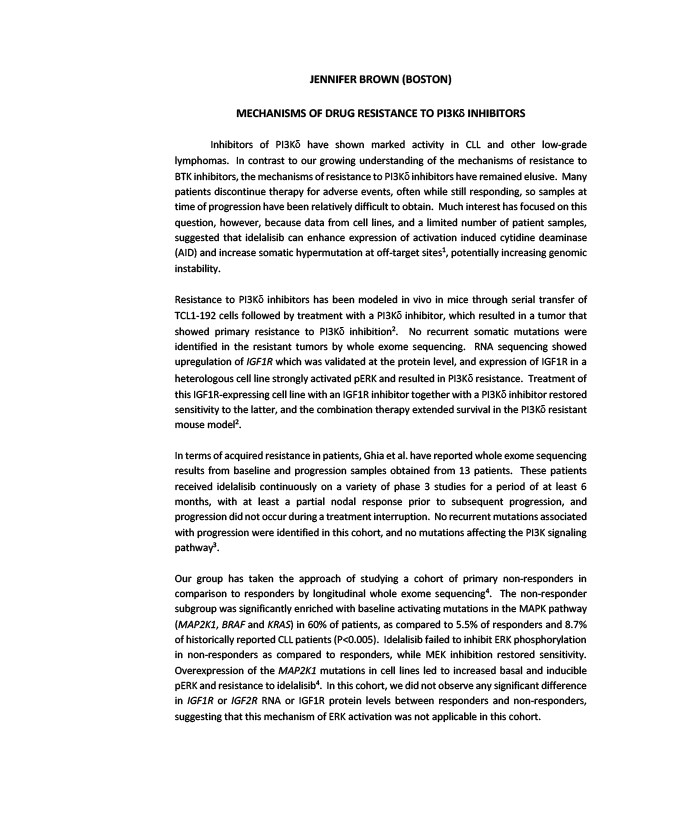
JENNIFER BROWN (BOSTON)
MECHANISMS OF DRUG RESISTANCE TO PI3Kd INHIBITORS
Inhibitors of PI3Kd have shown marked activity in CLL and other low-grade
lymphomas. In contrast to our growing understanding of the mechanisms of resistance to
BTK inhibitors, the mechanisms of resistance to PI3Kd inhibitors have remained elusive. Many
patients discontinue therapy for adverse events, often while still responding, so samples at
time of progression have been relatively difficult to obtain. Much interest has focused on this
question, however, because data from cell lines, and a limited number of patient samples,
suggested that idelalisib can enhance expression of activation induced cytidine deaminase
(AID) and increase somatic hypermutation at off-target sites1, potentially increasing genomic
instability.
Resistance to PI3Kd inhibitors has been modeled in vivo in mice through serial transfer of
TCL1-192 cells followed by treatment with a PI3Kd inhibitor, which resulted in a tumor that
showed primary resistance to PI3Kd inhibition2. No recurrent somatic mutations were
identified in the resistant tumors by whole exome sequencing. RNA sequencing showed
upregulation of IGF1R which was validated at the protein level, and expression of IGF1R in a
heterologous cell line strongly activated pERK and resulted in PI3Kd resistance. Treatment of
this IGF1R-expressing cell line with an IGF1R inhibitor together with a PI3Kd inhibitor restored
sensitivity to the latter, and the combination therapy extended survival in the PI3Kd resistant
mouse model2.
In terms of acquired resistance in patients, Ghia et al. have reported whole exome sequencing
results from baseline and progression samples obtained from 13 patients. These patients
received idelalisib continuously on a variety of phase 3 studies for a period of at least 6
months, with at least a partial nodal response prior to subsequent progression, and
progression did not occur during a treatment interruption. No recurrent mutations associated
with progression were identified in this cohort, and no mutations affecting the PI3K signaling
pathway3.
Our group has taken the approach of studying a cohort of primary non-responders in
comparison to responders by longitudinal whole exome sequencing4. The non-responder
subgroup was significantly enriched with baseline activating mutations in the MAPK pathway
(MAP2K1, BRAF and KRAS) in 60% of patients, as compared to 5.5% of responders and 8.7%
of historically reported CLL patients (P<0.005). Idelalisib failed to inhibit ERK phosphorylation
in non-responders as compared to responders, while MEK inhibition restored sensitivity.
Overexpression of the MAP2K1 mutations in cell lines led to increased basal and inducible
pERK and resistance to idelalisib4. In this cohort, we did not observe any significant difference
in IGF1R or IGF2R RNA or IGF1R protein levels between responders and non-responders,
suggesting that this mechanism of ERK activation was not applicable in this cohort.